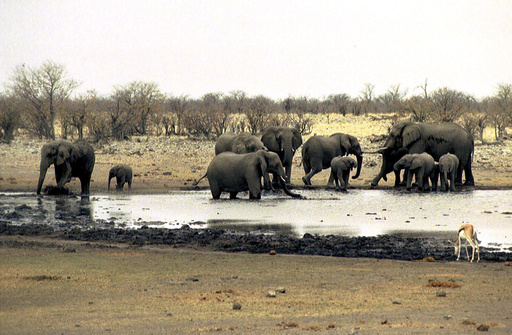Zimbabwe and Namibia have revealed plans to cull hundreds of elephants and other wild animals to alleviate food shortages among local residents due to severe drought conditions in the two southern African nations. Zimbabwe has resolved to allow the killing of 200 elephants, with their meat being distributed to communities in need. Meanwhile, Namibia is in the process of culling over 700 wild animals, including 83 elephants, as part of a strategy announced three weeks ago.
Tinashe Farawo, a spokesperson for the Zimbabwe National Parks and Wildlife Management Authority, stated that permits would be granted in needy communities to hunt elephants, with the agency also participating in culling some of the total allotment of 200 animals. The elephants will be culled from an area where the population has become unsustainable, particularly in regions like Hwange National Park, where escalating competition for food and water between humans and wildlife is prevalent, exacerbated by rising temperatures and scarce resources.
Hwange National Park, known to house more than 45,000 elephants, only has the capacity to support around 15,000, as mentioned by Farawo. The national parks in the country are struggling to sustain the overall elephant population of about 100,000, which is twice the carrying limit of the parks, according to park officials. The El Nino weather pattern has aggravated the situation, with over 100 elephants reported dead due to drought in December, and more animals are at risk of dying from thirst and hunger during the upcoming peak of the hot season.
Zimbabwe’s Environment Minister Sithembiso Nyoni informed Parliament of the approval for the culling program, emphasizing the excess elephant population compared to the forestry’s capabilities. Similarly, Namibia recently sanctioned the culling of 723 animals from five national parks, including elephants, hippos, buffalos, impalas, zebras, and elands, aiming to manage the conflicts between humans and wildlife while utilizing natural resources for the benefit of Namibian citizens.
Although Botswana, with the world’s largest elephant population at 130,000, has not considered culling its elephants to address food shortages, neighboring countries Zimbabwe and Namibia have determined it as an essential measure amid the severe drought. Guyo Roba, a food security and agricultural expert from the Kenya-based environmental think tank Jameel Observatory, acknowledged the challenging decision faced by the governments in managing wildlife populations exceeding their carrying capacities, balancing conservation efforts with addressing the needs of their populations.
